The role and function of vitamin B

|
Vitamins are needed by the human body, and there are many types of vitamins. So when choosing vitamin supplements, you need to choose according to the vitamins you lack. This will be of great help to all aspects of your body. So what are the effects and functions of vitamin B? Vitamin B is an element needed by the human body, and it is very helpful to improve human immunity and appetite. However, there are many types of vitamin B, so what are the effects and functions of vitamin B? Its effects and functions are relatively broad. Before choosing it, it is also necessary to have a good understanding of all aspects of it so that you can choose with confidence. The role and function of vitamin B: The physiological function of vitamin B1 is to increase appetite, maintain normal nerve activity, etc. Vitamin B1 is converted into thiamine pyrophosphate (also known as cocarboxylase) in the body and participates in the metabolism of sugar in the body. Therefore, when vitamin B1 is deficient, the oxidation of sugar in the tissues is affected. In addition, it also has the effect of inhibiting the activity of cholesterase. Vitamin B2 is an important component of the cofactors of many enzyme systems in the body and is involved in the metabolism of matter and energy. It can promote development and cell regeneration, promote normal growth of skin, nails, and hair, help eliminate inflammation in the mouth, lips, and tongue, improve vision, reduce eyestrain, and interact with other substances to help the metabolism of carbohydrates, fats, and proteins. Vitamin B3 is not only a vitamin that maintains the health of the digestive system, but also an indispensable substance for the synthesis of sex hormones. For modern people whose lives are full of stress, the role of niacin in maintaining the health of the nervous system and the normal functioning of the brain should never be ignored. It promotes a healthy digestive system and relieves gastrointestinal disorders; makes the skin healthier; prevents and relieves severe migraines; promotes blood circulation and lowers blood pressure; and relieves diarrhea. Vitamin B5 participates in the production of energy in the body and can control fat metabolism. It is an essential nutrient for the brain and nerves. It can resist stress, cold, infection, prevent the toxicity of certain antibiotics, and eliminate postoperative abdominal distension; it helps the secretion of anti-stress hormones (steroids) in the body; it has the function of producing antibodies and can maintain the health of blood, skin and hair. Vitamin B6 has the functions of inhibiting vomiting and promoting development. Its lack can cause symptoms such as vomiting and cramps. It includes three substances, namely pyridoxine, pyridoxal and pyridoxamine. Pyridoxine is converted into pyridoxal in the body, and pyridoxal and pyridoxamine can be converted into each other. Vitamin B7 is an essential substance for the synthesis of vitamin C and is indispensable for the normal metabolism of fat and protein. It is a water-soluble vitamin necessary to maintain the natural growth and normal function of the human body. It is an indispensable substance for the metabolism of fat and protein, can enhance the body's immune response and resistance, and is also a necessary nutrient for maintaining normal growth, development and health, and helps control diabetes. Vitamin B9 is involved in cell proliferation, reproduction, heme synthesis and other functions, and has a significant impact on the differentiation and maturation of blood cells and fetal development (blood cell proliferation and fetal neurodevelopment). Avoiding the accumulation of homocysteine can protect the heart and blood vessels and may also slow the onset of Alzheimer's disease. Vitamin B12 can promote the development and maturation of red blood cells, keep the body's hematopoietic function in a normal state, and prevent pernicious anemia; existing in the form of a coenzyme, it can increase the utilization rate of folic acid and promote the metabolism of carbohydrates, fats and proteins; it has the function of activating amino acids and promoting the biosynthesis of nucleic acids, and can promote protein synthesis. It plays an important role in the growth and development of infants and young children; it metabolizes fatty acids so that fats, carbohydrates and proteins are properly used by the body; it eliminates irritability, concentrates attention, enhances memory and sense of balance; it is an indispensable vitamin for the healthy function of the nervous system, participates in the formation of a lipoprotein in nervous tissue, and maintains the health of the nervous system. Through the above introduction, we have a good understanding of the role and function of vitamin B. This nutrient element has a very good effect in helping the human body. However, when supplementing it, it must be done in moderation so that it will not cause too much damage to various aspects of the body, and you can rest assured when using it. |
Recommend
I gained 10 pounds by eating whole wheat bread for a month
Tian×ism whole wheat bread, which sold 36 million...
What soup is good for Tianma
Gastrodia elata is a relatively precious Chinese ...
The efficacy and side effects of stone yellow peel
The main effect of orchid peel is to relieve coug...
The efficacy and function of black bones
Black bone is a kind of traditional Chinese medic...
What to do if girls have too high testosterone
Androgens are hormones that promote the appearanc...
How does Impatiens “dye” the Chinese colors in ancient poetry?
Produced by: Science Popularization China Author:...
Do you have a small hole in front of your ear? This is a memorial left by your fish ancestors
I wonder if you have noticed that there is a pair...
What problems need to be solved in building a lunar base?
To establish a long-term base on the moon, we mus...
What you think is “fat” may not be fat, and what you think is “not fat” may be really fat…
Today is United Nations Diabetes Day. It is well ...
The efficacy and function of Viburnum birchii
For many Chinese people, traditional Chinese medi...
The efficacy and function of licorice
Licorice is a very good medicinal material. It is...
This new project is harvesting primary school students, one card can be sold for 210,000! Be careful
Since its inception, card-drawing mobile games ha...
The "super battery" that can store 800,000 kWh of electricity is here. How does it work?
Produced by: Science Popularization China Produce...
The efficacy and function of Faroe Sea
Traditional Chinese medicine culture is profound ...









